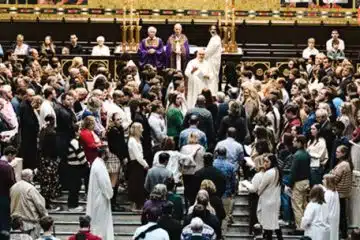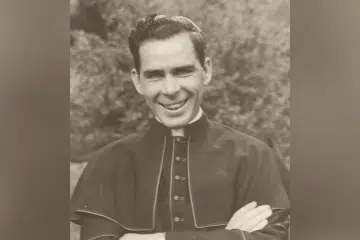CDF highlights its Note on Catholics in politics in letter to US bishops on Eucharistic coherence
by Carl Bunderson
Denver Newsroom, May 10, 2021 / 15:16 pm America/Denver (CNA).
The prefect of the Congregation for the Doctrine of the Faith wrote Friday to the head of the US Conference of Catholic Bishops regarding admission to Communion, affirming the centrality of the congregation’s 2002 note on Catholic’s participation in politics and the importance of safeguarding the rights of ordinaries in their local Churches.
A 2004 memo from Joseph Cardinal Ratzinger, then the prefect of the same congregation, should “be discussed only within the context of the authoritative Doctrinal Note,” read the May 7 letter by Luis Cardinal Ladaria to Archbishop Jose Gomez of Los Angeles, which was obtained by CNA.
Archbishop Gomez had written the congregation in March to inform it that the US bishops will be addressing the situation of Catholics in public office who support permissive legislation regarding abortion, euthanasia, or other moral evils.
Cardinal Ladaria opened his reply by emphasizing that the 2004 letter from Cardinal Ratzinger to Theodore Cardinal McCarrick about the same problem “was in the form of a private communication to the bishops” and that “insofar, therefore, as these principles are not published by the Conference, they may be of assistance in the preparation of the draft of your document.”
He said Cardinal Ratzinger had “offered general principles on the worthy reception of Holy Communion in order to assist local ordinaries in the United States in their dealings with Catholic pro-choice politicians within their jurisdictions. Cardinal Ratzinger’s communication should thus be discussed only within the context of the authoritative Doctrinal Note which provides the teaching of the Magisterium on the theological foundation for any initiative regarding the question of worthy reception of Holy Communion.”
The cardinal noted that the Doctrinal Note on some questions regarding the participation of Catholics in political life was discussed during the 2004 US ad liminas, during which “it was clear that there was a lack of agreement regarding the issue of communion among the bishops,” and that “the development of a national policy” was not then under consideration.
He added that the problem arose again during the 2019-20 US ad liminas, and that the congregation “advised that dialogue among the bishops be undertaken to preserve the unity of the episcopal conference in the face of disagreements over this controversial topic. The formulation of a national policy was suggested during the ad limina visits only if this would help the bishops to maintain unity.”
“This Congregation notes that such a policy, given its possibly contentious nature, could have the opposite effect and become a source of discord rather than unity within the episcopate and the larger Church in the United States. Thus, we advised during the ad limina visits that the effective development of a policy in this area requires that dialogue occurs in two stages: first among the bishops themselves, and then between bishops and Catholic pro-choice politicians within their jurisdictions.”
Cardinal Ladaria urged that the episcopal dialogue would help the bishops “agree as a Conference that support of pro-choice legislation is not compatible with Catholic teaching.”
“The bishops should therefore discuss and agree to the teaching in the above-mentioned Doctrinal Note which affirms in article 3 that ‘Christians are called to reject, as injurious to democratic life, a conception of pluralism that reflects moral relativism and accept that democracy must be based on the true and solid foundation of non-negotiable ethical principles, which are the underpinning of life in society.’ The bishops should affirm as a Conference that ‘those who are directly involved in lawmaking bodies have a grave and clear obligation to oppose any law that attacks human life’,” the prefect of the CDF wrote.
Having done this, local ordinaries “would reach out to and engage in dialogue with Catholic politicians within their jurisdictions who adopt a pro-choice position regarding abortion legislation, euthanasia, or other moral evils, as a means of understanding the nature of their positions and their comprehension of Catholic teaching,” stated Cardinal Ladaria.
After these “two stages of extensive and serene dialogue”, then would the USCCB “face the difficult task of discerning the best way forward for the Church in the United States to witness to the grave moral responsibility of Catholic public officials to protect human life at all stages.”
“If it then decided to formulate a national policy on worthiness for communion, such a statement would need to express a true consensus of the bishops on the matter, while observing the prerequisite that any provisions of the Conference in this area would respect the rights of individual Ordinaries in their dioceses and the prerogatives of the Holy See.”
The cardinal added that “any statement of the Conference regarding Catholic political leaders would best be framed within the broad context of worthiness for the reception of Holy Communion on the part of all the faithful, rather than only one category of Catholic, reflecting their obligation to conform their lives to the entire Gospel of Jesus Christ as they prepare to receive the sacrament.”
He said that “it would be misleading if such a statement were to give the impression that abortion and euthanasia alone constitute the only grave matters of Catholic moral and social teaching that demand the fullest level of accountability on the part of Catholics.”
Cardinal Ladaria urged that “every effort” be be made “to dialogue with other episcopal conferences” so as “to preserve unity” in the universal Church.
Archbishop Gomez transmitted Cardinal Ladaria’s letter to each of the bishops in the US May 8, as requested. He noted that the prefect “has provided us with important background and insight that should prove helpful to us in our continued prayer and discernment of this matter.”
Cardinal Ratzinger’s 2004 memo told US bishops that a Catholic politician “consistently campaigning and voting for permissive abortion and euthanasia laws” is engaged in “manifest” and “formal cooperation” in grave sin.
In such a case, the politician’s “pastor should meet with him, instructing him about the Church’s teaching, informing him that he is not to present himself for Holy Communion until he brings to an end the objective situation of sin, and warning him that he will otherwise be denied the Eucharist,” Cardinal Ratzinger wrote, adding that if the Catholic perseveres in grave sin and still presents himself for Holy Communion, “the minister of Holy Communion must refuse to distribute it.”
That 2004 memo was an application of canon 915 of the Code of Canon Law, which says that Catholics “obstinately persevering in manifest grave sin are not to be admitted to holy communion.”
Local ordinaries have in recent months been teaching about admission to Communion.
In March, Bishop Thomas Paprocki of Springfield in Illinois told a regional conference of the Canon Law Society of America that Catholics who publicly and obstinately advocate for abortion, including politicians, can and should be denied Communion: “I’m talking about their external actions. If they’re living in a way or holding positions that are contrary to church teaching, then the Minister of Communion has to deny them the sacrament.”
Bishop Thomas Olmsted of Phoenix released Veneremur Cernui, an apostolic exhortation on the sacrament of the Holy Eucharist, in April. It says that “Holy Communion is reserved for those, who with God’s grace make a sincere effort to live this union with Christ and His Church by adhering to all that the Catholic Church believes and proclaims to be revealed by God.” This is why the Church “requires Catholic leaders who have publicly supported gravely immoral laws such as abortion and euthanasia to refrain from receiving Holy Communion until they publicly repent and receive the Sacrament of Penance,” Bishop Olmsted taught.
In an April 14 column on Eucharistic coherence, Archbishop Samuel Aquila of Denver wrote that “the Eucharist is a gift, not an entitlement, and the sanctity of that gift is only diminished by unworthy reception. Because of the public scandal caused, this is especially true in the case of public officials who persistently govern in violation of the natural law, particularly the pre-eminent issues of abortion and euthanasia, the taking of innocent life, as well as other actions that fail to uphold the church’s teaching regarding the dignity of life.”
In a May 1 pastoral letter, Archbishop Salvatore Cordileone of San Francisco taught that any Catholic formally cooperating with abortion should refrain from receiving the Eucharist.
During his homily at the Vigil Mass for Life in January, Archbishop Joseph Naumann of Kansas City in Kansas taught that Catholics should not receive Communion if they are contradicting “fundamental” Church teaching.
Bishop McElroy of San Diego recently wrote an essay in America Magazine arguing that refusing Holy Communion to pro-abortion rights politicians politicizes the Eucharist, and Blase Cardinal Cupich of Chicago took issue with Archbishop Aquila’s column on Eucharistic coherence.
In October 2019, while campaigning for president, Joe Biden was denied Communion at a parish in the Diocese of Charleston. A Charleston diocesan policy, which is also that of the Archdiocese of Atlanta and the Diocese of Charlotte, states that “Catholic public officials who consistently support abortion on demand are cooperating with evil in a public manner. By supporting pro-abortion legislation they participate in manifest grave sin, a condition which excludes them from admission to Holy Communion as long as they persist in the pro-abortion stance.”













